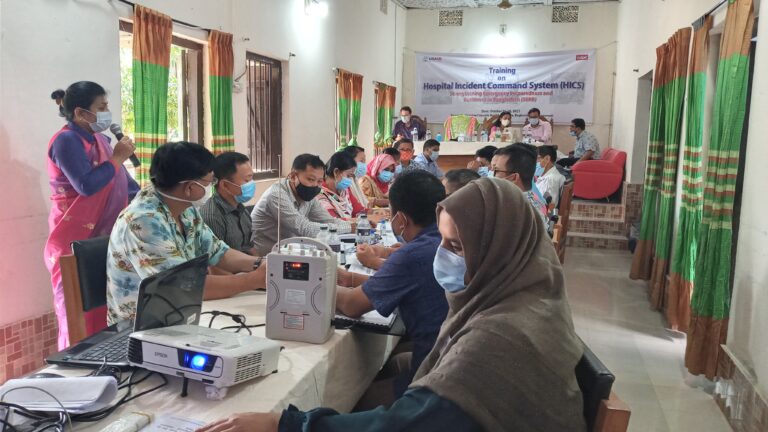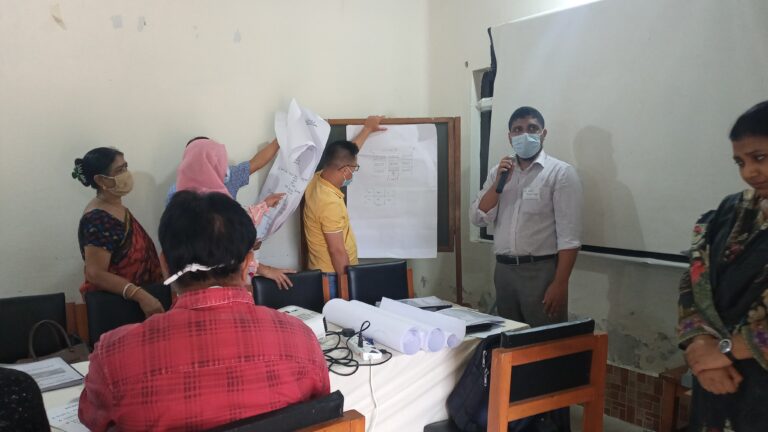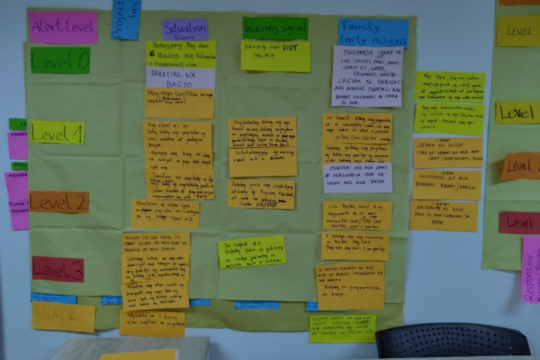The Asian Disaster Preparedness Partnership (ADPC) through its Strengthening Emergency Response in Bangladesh (SERB) program conducted a three-day Hospital Incident Command System (HICS) training in Rangamati: a hill district in Chittagong, Bangladesh. The training was organized from 26 – 28 October 2021 in partnership with the Directorate General of Health Services (DGHS) and the National Institute of Preventive and Social Medicines (NIPSOM) supported by USAID-BHA.
The aim behind HICS training is to develop the capacity of the hospital disaster management committee members and hospital managers to manage mass casualty events. The HICS has been conceptualized as part of the SERB program, which aims to reduce the impact of disasters by institutionalizing emergency preparedness and achieving an integrated approach for emergency management at national, sub-national, and community levels in Bangladesh.
HICS in Rangamati
Rangamati is highly prone to landslides, due to heavy rainfall, deforestation, and weak soil structure. The lack of an emergency management system in the region multiplies the effect of disasters. The HICS training in Rangamati is part of building a robust emergency management system through first responder training and reducing the impact of disasters in the region.
HICS program seeks to bring medical and administrative leaders and staff in hospital-based disaster management together to discuss the principles of disaster management and develop practical steps toward preparing to respond to disaster and mass casualty events. 23 medical professionals from Baghaichari Upazila Health Complex (UHC) Rangamati, a course coordinator, instructors, representatives from ADPC, and one representative from ASHIKA Development Associates attended the training.
UHC is the first referral health facility at the primary level of the health care delivery system in Bangladesh and the Government provides healthcare services to its rural people through these facilities. Training the medical fraternity of the UHCs will strengthen the country’s capabilities to manage mass casualty events and be prepared to take action in hospitals.

The training commenced by covering the basics and dwelled on subjects like Incident Management Functions, Incident Planning, External Coordination, and Support, etc.
On the second day, the training was focused on subjects like Communication and Coordination, Command, Education, Planning Section, Finance, etc. On the final day of the training, participants were divided into two groups, and each group was given a different disaster situation to work out. The given scenarios were:
- Cyclone at the local beach, full of tourists
- Cyclone at the airport, affecting an aircraft full of passengers
Applying their learnings from the first two days of the training, the groups presented solutions with a detailed call to action that the participants would take in case of a disaster or mass casualty event. The groups presented how they would coordinate with authorities, rescue victims, and manage dead bodies to minimize the loss of life.

The event ended with remarks from Dr. Iftakhar Ahmed, UHFPO of Baghaichari Upazila Health Complex, who applauded the training team and said, “I appreciate the team for visiting Baghaichari conducting the three-day training despite the challenging transportation system and rough terrain.”


